|
|
|
|
|
By
Muguette Goufrani
.
 As
part of my decade living on Africa's West Coast, our family
spent a memorable year in the Republic of Gabon, which hugs
the Atlantic, straddles the equator and is roughly the size
of France. Being health fanatics and outdoor types, my
mother Suzanne, brother Jean Pierre and I thrived in the
hot, humid climate - and in 12 months, managed to visit much
of the countryside. This gave us an intimate connection with
the Gabonaise culture and was valuable in my future career
in tourism. We enjoyed a laid back, tropical lifestyle; food
was delicious and varied, the shops and stalls were full of
interesting items and tempting snacks. What's more, to our
delight, the traditional West African culture had in no way
disappeared with the oil boom. Thanks to mineral wealth and
a relatively low population growth, Gabon is better off
financially than most of Africa. This fact is reflected in
their care and attention to basic ecological concerns. For
example, the vast coastal wetlands and marshes, are still
largely intact. This is something with which ATA members
will heartily agree, the Association being a strong advocate
of ecotourism. Gabon, which hosted the Africa Travel
Association (ATA) International Congress in 1980, is easily
accessible from the USA and Canada. As
part of my decade living on Africa's West Coast, our family
spent a memorable year in the Republic of Gabon, which hugs
the Atlantic, straddles the equator and is roughly the size
of France. Being health fanatics and outdoor types, my
mother Suzanne, brother Jean Pierre and I thrived in the
hot, humid climate - and in 12 months, managed to visit much
of the countryside. This gave us an intimate connection with
the Gabonaise culture and was valuable in my future career
in tourism. We enjoyed a laid back, tropical lifestyle; food
was delicious and varied, the shops and stalls were full of
interesting items and tempting snacks. What's more, to our
delight, the traditional West African culture had in no way
disappeared with the oil boom. Thanks to mineral wealth and
a relatively low population growth, Gabon is better off
financially than most of Africa. This fact is reflected in
their care and attention to basic ecological concerns. For
example, the vast coastal wetlands and marshes, are still
largely intact. This is something with which ATA members
will heartily agree, the Association being a strong advocate
of ecotourism. Gabon, which hosted the Africa Travel
Association (ATA) International Congress in 1980, is easily
accessible from the USA and Canada.
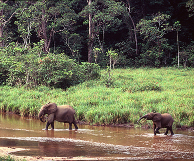 Gabon's
Great Leap: With a stable government and 11 percent of the
country's land area set aside for the parks, Gabon is
uniquely positioned to become the ecotourism capital of
Africa. Photographer Nicolas Reynard trekked through Gabon's
new national park system, where lush forests hide Africa's
largest concentration of undisturbed-and camera - shy -
animals. Could these parks change the face of ecotourism and
preservation in the Congo Basin? When French photographer
Nicolas Reynard and writer Tom Clynes set out to test drive
three of Gabon's 13 new national parks for "The Gabon
Experiment,” they expected dozens of close encounters
with the forest's denizens of hippos, elephants, gorillas,
and mandrills. Excerpt
from National Geographic. Gabon's
Great Leap: With a stable government and 11 percent of the
country's land area set aside for the parks, Gabon is
uniquely positioned to become the ecotourism capital of
Africa. Photographer Nicolas Reynard trekked through Gabon's
new national park system, where lush forests hide Africa's
largest concentration of undisturbed-and camera - shy -
animals. Could these parks change the face of ecotourism and
preservation in the Congo Basin? When French photographer
Nicolas Reynard and writer Tom Clynes set out to test drive
three of Gabon's 13 new national parks for "The Gabon
Experiment,” they expected dozens of close encounters
with the forest's denizens of hippos, elephants, gorillas,
and mandrills. Excerpt
from National Geographic.
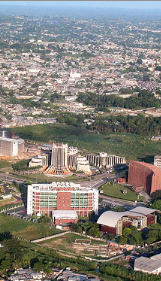 West
Africa's Freedom City:
Libreville, our home at the time, began as a settlement
for freed slaves on the site of a naval fortress. How did it
get its name? In 1849, our French ancestors captured a slave
ship, releasing all of the passengers at the mouth of the
Komo River. In joyous response and gratitude, the newly
freed slaves named their settlement Libreville (Free Town).
A lively and charming capital, Libreville reminds me of a
quieter, more laid back 50s version of Miami Beach, with its
large ocean-view hotels. To name a few, there's the Hotel
Mont-Bouet, the Ebene, Rendema Meridien, Novotel's
Rapontchombo, Hotel Okoume Palace Inter-Continental, Hotel
Mont de Crystal and Hotel Gamba. West
Africa's Freedom City:
Libreville, our home at the time, began as a settlement
for freed slaves on the site of a naval fortress. How did it
get its name? In 1849, our French ancestors captured a slave
ship, releasing all of the passengers at the mouth of the
Komo River. In joyous response and gratitude, the newly
freed slaves named their settlement Libreville (Free Town).
A lively and charming capital, Libreville reminds me of a
quieter, more laid back 50s version of Miami Beach, with its
large ocean-view hotels. To name a few, there's the Hotel
Mont-Bouet, the Ebene, Rendema Meridien, Novotel's
Rapontchombo, Hotel Okoume Palace Inter-Continental, Hotel
Mont de Crystal and Hotel Gamba.
Libreville's chalk
white buildings contrast dramatically with the dappled green
shades of the nearby equatorial forest. It's a city of
modern office buildings, fancy shops, supermarkets and
white, sandy beaches inside city limits. Not far away (140
km) on the south coast is Port -Gentil on Ile de Mandji, a
coastal island to the south. Fueled by oil funds and
relatively high wages, the town has dozens of restaurants,
night clubs and unique shops.
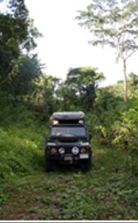 Getting
around in Gabon:
The country's national carrier, Air Gabon, has regular
flights from Libreville International Airport to Paris, Rome
and London as well as several cities in Africa. Air Gabon is
one of the three or four best African airlines serving
Central and West Africa. If you are arranging a bus tour, or
taking a rental vehicle, there are over 5,000 miles of good
road. A Land Rover or other 4-wheel drive vehicle is
recommended in much of the forested
areas. I Getting
around in Gabon:
The country's national carrier, Air Gabon, has regular
flights from Libreville International Airport to Paris, Rome
and London as well as several cities in Africa. Air Gabon is
one of the three or four best African airlines serving
Central and West Africa. If you are arranging a bus tour, or
taking a rental vehicle, there are over 5,000 miles of good
road. A Land Rover or other 4-wheel drive vehicle is
recommended in much of the forested
areas. I
-
Muguette
Goufrani,
Africa Travel Magazine's Associate Editor/ Pubisher, covers
West African destinations and events. Her native language is
French and she has lived in five African countries, working
for Air Afrique, Royal Air Maroc and Citroen. As a Travel
Agent, she worked in North Africa, where her family operated
an inbound tour company, and later in Tahiti and Cambodia.
Muguette has been a partner in the magazine since it was
founded in 1995.
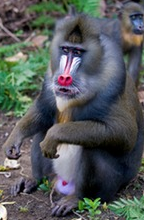
Credits: Legesse
Travel and Tourism, New York, NY, USA
|
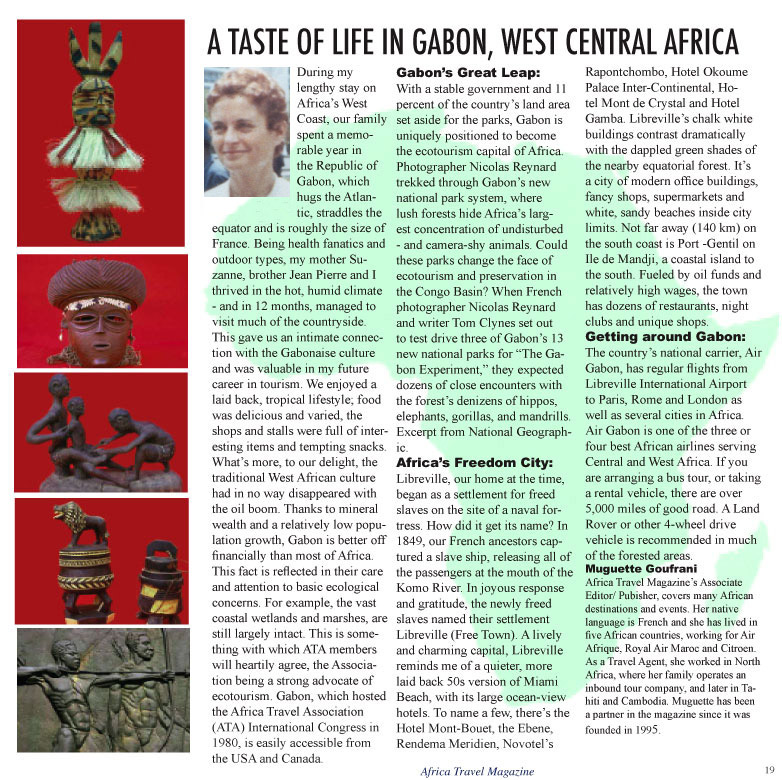
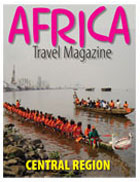
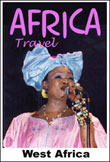
 As
part of my decade living on Africa's West Coast, our family
spent a memorable year in the Republic of Gabon, which hugs
the Atlantic, straddles the equator and is roughly the size
of France. Being health fanatics and outdoor types, my
mother Suzanne, brother Jean Pierre and I thrived in the
hot, humid climate - and in 12 months, managed to visit much
of the countryside. This gave us an intimate connection with
the Gabonaise culture and was valuable in my future career
in tourism. We enjoyed a laid back, tropical lifestyle; food
was delicious and varied, the shops and stalls were full of
interesting items and tempting snacks. What's more, to our
delight, the traditional West African culture had in no way
disappeared with the oil boom. Thanks to mineral wealth and
a relatively low population growth, Gabon is better off
financially than most of Africa. This fact is reflected in
their care and attention to basic ecological concerns. For
example, the vast coastal wetlands and marshes, are still
largely intact. This is something with which ATA members
will heartily agree, the Association being a strong advocate
of ecotourism. Gabon, which hosted the Africa Travel
Association (ATA) International Congress in 1980, is easily
accessible from the USA and Canada.
As
part of my decade living on Africa's West Coast, our family
spent a memorable year in the Republic of Gabon, which hugs
the Atlantic, straddles the equator and is roughly the size
of France. Being health fanatics and outdoor types, my
mother Suzanne, brother Jean Pierre and I thrived in the
hot, humid climate - and in 12 months, managed to visit much
of the countryside. This gave us an intimate connection with
the Gabonaise culture and was valuable in my future career
in tourism. We enjoyed a laid back, tropical lifestyle; food
was delicious and varied, the shops and stalls were full of
interesting items and tempting snacks. What's more, to our
delight, the traditional West African culture had in no way
disappeared with the oil boom. Thanks to mineral wealth and
a relatively low population growth, Gabon is better off
financially than most of Africa. This fact is reflected in
their care and attention to basic ecological concerns. For
example, the vast coastal wetlands and marshes, are still
largely intact. This is something with which ATA members
will heartily agree, the Association being a strong advocate
of ecotourism. Gabon, which hosted the Africa Travel
Association (ATA) International Congress in 1980, is easily
accessible from the USA and Canada. Gabon's
Great Leap: With a stable government and 11 percent of the
country's land area set aside for the parks, Gabon is
uniquely positioned to become the ecotourism capital of
Africa. Photographer Nicolas Reynard trekked through Gabon's
new national park system, where lush forests hide Africa's
largest concentration of undisturbed-and camera - shy -
animals. Could these parks change the face of ecotourism and
preservation in the Congo Basin? When French photographer
Nicolas Reynard and writer Tom Clynes set out to test drive
three of Gabon's 13 new national parks for "The Gabon
Experiment,” they expected dozens of close encounters
with the forest's denizens of hippos, elephants, gorillas,
and mandrills.
Gabon's
Great Leap: With a stable government and 11 percent of the
country's land area set aside for the parks, Gabon is
uniquely positioned to become the ecotourism capital of
Africa. Photographer Nicolas Reynard trekked through Gabon's
new national park system, where lush forests hide Africa's
largest concentration of undisturbed-and camera - shy -
animals. Could these parks change the face of ecotourism and
preservation in the Congo Basin? When French photographer
Nicolas Reynard and writer Tom Clynes set out to test drive
three of Gabon's 13 new national parks for "The Gabon
Experiment,” they expected dozens of close encounters
with the forest's denizens of hippos, elephants, gorillas,
and mandrills.  West
Africa's Freedom City:
Libreville, our home at the time, began as a settlement
for freed slaves on the site of a naval fortress. How did it
get its name? In 1849, our French ancestors captured a slave
ship, releasing all of the passengers at the mouth of the
Komo River. In joyous response and gratitude, the newly
freed slaves named their settlement Libreville (Free Town).
A lively and charming capital, Libreville reminds me of a
quieter, more laid back 50s version of Miami Beach, with its
large ocean-view hotels. To name a few, there's the Hotel
Mont-Bouet, the Ebene, Rendema Meridien, Novotel's
Rapontchombo, Hotel Okoume Palace Inter-Continental, Hotel
Mont de Crystal and Hotel Gamba.
West
Africa's Freedom City:
Libreville, our home at the time, began as a settlement
for freed slaves on the site of a naval fortress. How did it
get its name? In 1849, our French ancestors captured a slave
ship, releasing all of the passengers at the mouth of the
Komo River. In joyous response and gratitude, the newly
freed slaves named their settlement Libreville (Free Town).
A lively and charming capital, Libreville reminds me of a
quieter, more laid back 50s version of Miami Beach, with its
large ocean-view hotels. To name a few, there's the Hotel
Mont-Bouet, the Ebene, Rendema Meridien, Novotel's
Rapontchombo, Hotel Okoume Palace Inter-Continental, Hotel
Mont de Crystal and Hotel Gamba. Getting
around in Gabon:
The country's national carrier, Air Gabon, has regular
flights from Libreville International Airport to Paris, Rome
and London as well as several cities in Africa. Air Gabon is
one of the three or four best African airlines serving
Central and West Africa. If you are arranging a bus tour, or
taking a rental vehicle, there are over 5,000 miles of good
road. A Land Rover or other 4-wheel drive vehicle is
recommended in much of the forested
areas. I
Getting
around in Gabon:
The country's national carrier, Air Gabon, has regular
flights from Libreville International Airport to Paris, Rome
and London as well as several cities in Africa. Air Gabon is
one of the three or four best African airlines serving
Central and West Africa. If you are arranging a bus tour, or
taking a rental vehicle, there are over 5,000 miles of good
road. A Land Rover or other 4-wheel drive vehicle is
recommended in much of the forested
areas. I